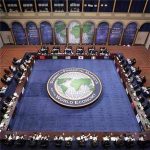“There was, of course, no way of knowing whether you were being watched at any given moment … It was even conceivable that they watched everybody all the time.”
That quote from George Orwell’s “1984” becomes increasingly prescient in light of developments in eavesdropping, pioneered by Google. Last week, the company launched a service called Latitude, which allows consenting users to monitor each other’s whereabouts. It’s the company’s latest snooping tool, the most controversial being the Street Views photographic mapping service.
When I tried Street Views by entering my address, I was surprised to see that with a single click a truly Orwellian image popped onto the screen: my house, my car, the newspaper in the driveway. I could zoom in for a clear view of the open window on the second floor and the handy drain pipe that potential burglars might use to reach that window when no one was home.
Google has been working on Street Views for nearly two years, an incredibly tedious process. As remarkable as the computer results are, they still require hired motorists, known as GeoImmersive Data Producers, to drive up and down every street using 11 roof-mounted cameras to snap 360-degree images.
A year ago, Google had photographed 23 U.S. municipalities; now, the figure has almost tripled.
When Street Views arrives in a community, it tends to spark great curiosity and debate. To some, it is an outrageous invasion of privacy. To others, including Google management, it is simply the latest beneficial — and commercially valuable — use of modern technology.
After arguing that Street Views showed nothing more than could be seen by anyone traveling on public property, Google agreed to blur faces and license plates. But by conceding that much, Google opens the door to demands that, say, doors should be blurred, and for that matter, upstairs windows and drain pipes.
Of course, it would be naive to think that Big Brother hasn’t been watching for some time. From the ceiling cameras in convenience stores to the government’s exotic keyhole satellites, we’re all photographed more often than we might care to believe. When U.S. Airways Flight 1549 went down unexpectedly in the Hudson River, hidden cameras on shore were able to capture it from several angles.
The federal government has warned Google not to photograph military installations. Then there’s North Oaks, Minn., whose City Council contacted Google on behalf of its 4,500 residents, demanding that all photos taken within its borders be deleted.
Existing law makes distinctions between public property and private property; between public figures and private individuals. Yet in the Google Universe, these boundaries become fuzzy.
What if I created a reality show for which I stationed a TV crew on the public street outside your house, and spent weeks photographing your every move? What if I edited the footage to show the funniest three minutes — including the time you backed the car over the tulips? And what if, unlike Candid Camera, I televised it without your permission?
Or, what if I paid a team of data producers to go through thousands of Street Views, including the one with your home, looking for driveways in need of repair, then sold the list to a paving company?
With each breakthrough, some laws will require re-examination. So, too, will our definition of privacy.
As someone who, like my father Allen Funt, devoted many years to photographing unsuspecting people, I can report that the latest developments give me pause. It’s one thing to have a brief, once-in-a-lifetime encounter with a hidden camera. It’s another thing to live, as Orwell put it, “in the assumption that every sound you made was overheard, and, except in darkness, every movement scrutinized.”
PETER FUNT
sursa: http://www.montereyherald.com/opinion/ci_11669729?source=rss












Adauga comentariu